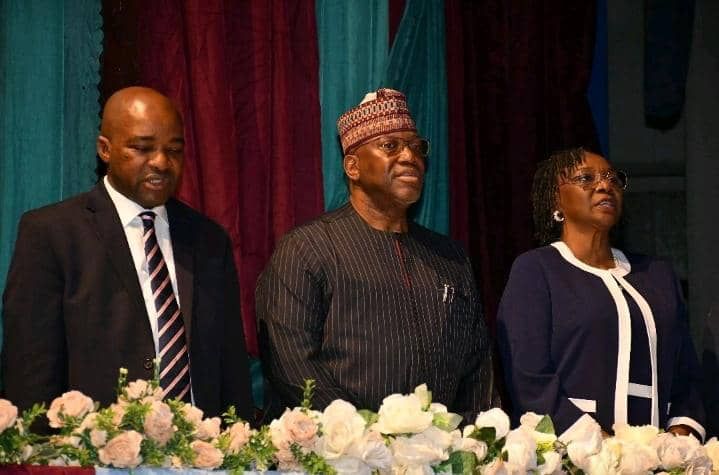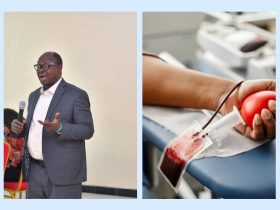

At the 2024 Annual Lecture of the School of Postgraduate Studies, University of Lagos (UNILAG), academics and business leaders emphasized the urgent need for stronger collaboration between universities and the private sector to drive Nigeria’s development. A lack of cooperation between these sectors has stifled innovation, slowed economic growth, and impeded the country’s ability to address its challenges. Elizabeth Chimobi reports.
As Nigeria faces mounting economic, social, and technological challenges, stakeholders say the need for collaboration between academia and the private sector has never been more critical.
They say both sectors are uniquely positioned to drive innovation and economic growth; however, they often operate in isolation, missing opportunities to create a cohesive and transformative impact.
Universities, as centers of knowledge and research, have the potential to offer groundbreaking solutions, while businesses possess the resources and platforms to scale these solutions to broader societal benefits.
However, the disconnect between what is taught in classrooms and what is required in the marketplace has led to a talent gap, underutilized research, and a slow pace of development.
To bridge this divide, stakeholders argue that a fundamental shift is needed—from seeing universities merely as academic institutions to recognizing them as vital engines of economic development, and from viewing businesses solely as profit-driven entities to embracing them as partners in innovation.
This year’s Annual Lecture at UNILAG, held at F. Ade. Ajayi Auditorium, served as a wake-up call, not just to acknowledge these gaps but to act upon them.
The discussions were a clarion call for a collaborative ecosystem where universities and businesses join forces to generate innovative solutions, tackle national problems, and redefine Nigeria’s future.
Despite the evident benefits of collaboration between universities and the private sector, several systemic barriers continue to hinder this partnership in Nigeria.
Policy gaps remain a significant challenge, with unclear guidelines and a lack of frameworks to facilitate seamless cooperation between academia and industry.
Many universities operate with outdated curricula that do not reflect the rapidly changing needs of the marketplace, resulting in graduates who are ill-prepared for the realities of the workforce.
Funding issues exacerbate the problem, as chronic underfunding of higher education institutions leaves little room for research and development initiatives that could attract private sector investment.
Additionally, there are cultural differences between academia and business; universities often prioritize theoretical knowledge and academic publications, while businesses are focused on practical solutions and profitability.
This disconnect fosters mistrust and prevents meaningful engagement, stifling innovation and slowing down economic progress.
Without a concerted effort to address these policy, financial, and cultural barriers, the potential for universities and businesses to work together in driving Nigeria’s development will remain untapped.
In his keynote address, the Chairman of the Nigerian Economic Summit Group (NESG), Mr. Olabisi Yusuf, argued that addressing Nigeria’s challenges and driving economic growth requires a stronger and more collaborative relationship between universities and businesses.
He highlighted the importance of integrating research, curriculum development, technology transfer, internships, and continuous professional development with industry needs.
Addressing the theme of the lecture, Innovative Synergies for Transformational Growth: From Collaboration to Integration, Yusuf highlighted the unique challenges Nigeria faces in the rapidly evolving global economy.
He argued that these challenges present opportunities for higher institutions to drive economic transformation through research and innovation. “Nigeria is a nation that needs help, but we don’t seem to be in a hurry to change,” Yusuf said, his words cutting through the silence of the room, challenging the status quo and urging a long-overdue conversation between the academic and business worlds.
In a country where universities are often perceived as isolated ivory towers and businesses are seen as driven solely by profit, Yusuf called for a transformative partnership—one where both sectors would come together, not as separate entities but as co-creators of a new economic reality.
“The challenges that Nigeria faces provide opportunities for higher institutions because research and innovation enable economic transformation. Our nation’s future depends on our ability to innovate, adapt, and create value. This can only be achieved when our centers of learning and our engines of economic growth work hand in hand.”
Yusuf’s analysis was candid and incisive as he highlighted the need for higher education to be more open to collaboration, suggesting that universities should see the private sector as partners in progress rather than adversaries.
The NESG chairman also highlighted the severe underfunding of many Nigerian universities, emphasizing how this financial constraint hampers their capacity to invest in research and development programs, which are crucial for attracting private sector partnerships.
At the same time, he called on businesses to invest in research and innovation as a business imperative, not merely a matter of corporate social responsibility.
“We must establish funding programs that foster joint initiatives, encouraging co-investment from academia, alumni, and industry,” he stated.
Yusuf further noted that “tertiary education is vital for personal development and societal progress, particularly within the context of Nigeria’s economy.”
His argument was built on examples from around the world where closer working relationships between universities and industry have yielded significant results, such as in the United States, Germany, and China.
To illustrate his point further, Yusuf outlined key areas where higher education and the private sector could collaborate more effectively.
These include curriculum redevelopment, research and development, internship and mentorship programs, technology transfer, and continuous professional development. Each of these areas, he argued, represents a vital component of a more integrated approach to national development.
“Academic curricula should incorporate practical skills and knowledge through real world problems and case studies.
“Establishing this with industry stakeholders is essential to keep educational programmes aligned with industry trends and technological advancements,” Yusuf said.
Yusuf’s presentation was met with widespread approval from the audience, who recognized the urgency and relevance of his message with a clap.
Yusuf’s presentation was met with widespread approval from the audience, who recognized the urgency and relevance of his message with a clap.
As he concluded his speech, he urged stakeholders in both sectors to take immediate action. “Start Small, Start Now,” he emphasized, underscoring the importance of not waiting for perfect conditions to begin the collaborations.
The room fell silent. It wasn’t just another lecture; it was a call to action for a nation at a crossroads. Could the collaboration between academia and industry be the key to unlocking Nigeria’s economic potential? Could the fusion of knowledge and enterprise be the catalyst for innovation and development in a country grappling with complex challenges? These were the questions that hung in the air, waiting for answers as the event unfolded.
Building on Yusuf’s argument, Vice-Chancellor of UNILAG, Prof. Folasade Ogunsola emphasized that the theme of the lecture aligns perfectly with UNILAG’s mission.
“As academics, we must do more than lament; we must put our great intellect to work in effectively solving our problems. We, therefore, ask the Town to join hands with the Gown so that we can all bring our strengths to bear on the advancement of our country,” she declared.
The Chairman of Channels Media Group and Chairman of the event Dr. John Momoh, also emphasized the need for a reorientation of higher education in Nigeria.
He argued that the country is at a crossroads and that innovative solutions must be driven by research.
His words: “Nigeria is at the crossroads. We need to innovate across all sectors and these innovations must be driven by research. The private sector must engage in postgraduate education, not as a corporate social responsibility, but as a business imperative. Academics must work closely with the Private Sector to turn academic research into marketable goods and services.
“The private sector is the engine of economic growth, which is why collaboration between universities and research institutions is very important,” Momoh said.
The lecture was not just an intellectual exercise; it was a clarion call for change according to the Dean of the School of Postgraduate Studies at UNILAG, Prof. Abraham Osinubi, who also underscored the critical role of postgraduate education in national development.
He described the lecture as a call to action, one that challenges both the academic and business communities to think boldly and act decisively. “This lecture is a clarion call for us to walk a path where knowledge meets enterprise and where academic rigour translates to economic resilience,” he noted.
The message was clear: to navigate the complexities of the 21st century, Nigeria needs its brightest minds and its most dynamic industries to come together and create solutions that would propel the nation forward.
The Annual Lecture Series of SPGS-UNILAG is a significant platform for dialogue on education and national development.





Leave a Reply
View Comments